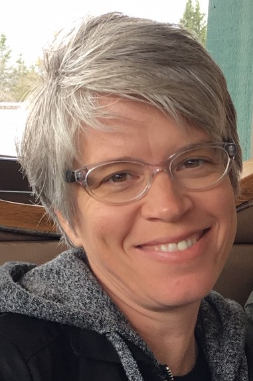Sarah Jane Shoenfeld

Sarah Jane Shoenfeld is an independent scholar and public historian specializing in DC history. Her work addresses DC’s racialized housing landscape and planning regime; the intersection of race and historic preservation; and the history of organizing around civil rights and Black governance in DC.
Sarah is a co-founder of the digital public history project Mapping Segregation in Washington DC, which is documenting the former extent of racially restricted housing in the nation's capital along with other historic mechanisms of segregation and serial displacement. The project won a 2019 Award for Excellence in Historic Preservation and continues to garner local and national attention from scholars, activists, educators and others interested in how systemically racist housing policies have shaped the cities we live in today. Sarah also co-founded the historical reseach firm Prologue DC in 2014, and prior to this was the lead historian for several DC Neighborhood Heritage Trails.
Sarah engages in a variety of public history projects, including research for exhibitions and films, historic landmark and district nominations, oral histories, and walking tours. Projects include research and writing for exhibits at DC’s Martin Luther King Jr. Memorial Library; landmark nominations and a National Register multiple property study on sites important to the Civil Rights and Black Power movements in DC, and to the history of public housing; the 20th Century African American Civil Rights Tour for DC’s Historic Preservation Office, and a successful nomination for the Bloomingdale Historic District, based, in part, on the neighborhood’s role as a national epicenter of legal challenges to racial covenants. In 2021, Sarah helped found DC Legacy Project, which is working to secure the future public use of five historically landmarked public housing buildings at Barry Farm, in Southeast DC, for cultural and educational activities. In 2023, Sarah co-organized with former DC Councilmember Carol Schwartz a keynote session for the annual DC History Conference commemorating the 50th anniversary of the DC Home Rule Act.
Sarah has produced historical essays and exhibit content for the National Capital Planning Commission, the Smithsonian Institution, the National Archives, the Congressional Black Caucus Foundation, American Experience (PBS), WGBH-TV, and Blackside, among others. Sarah received an M.A. in History and a Certificate in Public History from Northeastern University. She grew up and lives in DC.
Reparative Justice for DC: Why Reparations are Due and How to Pay for Them, Medium, July 25, 2023.
Susanna F. Schaller, Aaron Howe, Coy McKinney and Sarah Shoenfeld, “Making Power Visible: Business improvement districts and creative placemaking in Washington, DC,” Urban Studies, May 2023.
Review, Jim Crow Capital: Women and Black Freedom Struggles in Washington, D.C., 1920-1945, by Mary-Elizabeth Murphy, Washington History, Fall 2021.
Natalie Campbell and Sarah Jane Shoenfeld, “Demanding the Vote for Black Majority DC: Dr. King’s Home Rule Tour,” Washington History, Fall 2021.
“Say Their Names,” Washington History 32:1/2, Fall 2020.
Review, Black Food Geographies: Race, Self-Reliance, and Food Access in Washington, D.C., by Ashanté M. Reese, Washington History 32:1/2, Fall 2020.
"Barry Farm's historic landmark designation was pitted against affordable housing,"
The Washington Post, Feb. 21, 2020
“The history and evolution of Anacostia’s Barry Farm,” D.C. Policy Center, July 9, 2019.
"Mapping segregation in D.C.," D.C. Policy Center, Apr. 23, 2019.
"Race and Real Estate in Mid-Century DC,” D.C. Policy Center, Apr. 16, 2019.
"Open Data Meets History: Mapping Segregation in American Cities, Then and Now," for Open Cities: Open Data: Collaborative Cities in the Information Era (Palgrave Macmillan, 2020).
Review, Race, Class, and Politics in the Cappucino City, by Derek S. Hyra, Washington History 30: 1, Spring 2018.
"Don't let development push out low-income residents," The Washington Post, Mar. 23, 2018.
"How segregation shaped DC's northernmost ward," Greater Greater Washington, Sep. 14, 2017.
"DC's Comprehensive Plan, a document we use today, preserves the racial segregation of our past,"
Greater Greater Washington, June 13, 2017.
"'A Strictly White Residential Section': The Rise and Demise of Racially Restrictive Covenants in Bloomingdale," Washington History 29: 1, Spring 2017.
Review, Just Another Southern Town: Mary Church Terrell and the Struggle for Racial Justice in the Nation’s Capital, by Joan Quigley (H-AfroAm, Feb. 2017).
Project historian for documentary film Diminished Returns: The Black Wealth Gap in Washington DC (to be released in 2024)
Project Director, “When public housing was new: How growing up at Barry Farm shaped a community,” (short film based on oral histories conducted in 2023 with former residents of Barry Farm Dwellings).
Writing a young adult book about mid-20th century DC activist Julius Hobson, a leader in demanding equal education for Black students, Black access to housing and employment, Black political leadership, and statehood for DC.
Serving on advisories for Beyond Granite, Undesign the Redline DC, and U.Penn/National Park Service project Landscapes of Civil Rights in Washington DC.
Gallery Talk: "About Time", Greater DC and the Depiction of Urban Flux, April 29, 2023, American University Museum, Apr. 29, 2023 (Sarah presents at 03:20 and in Q&A)
Mapping Spatial Violence: dispossession, public housing, and “new communities,” Society for Architectural Historians Latrobe Chapter, Feb. 23, 2021
Drawing Lines: How Race Shaped DC's Housing Landscape, DC History Center, Jan. 27, 2021
Julius Hobson: Maverick for Justice (Sarah curated and moderated this panel), Humanities DC, Dec. 10, 2020
Historic Preservation: Of the People, By the People, For the People?, DC History Conference, Nov. 13, 2020 (Sarah presents at 15:20 and in Q&A)
Race and Real Estate in 20th Century Washington DC, Greater Capital Area Association of Realtors, September 21, 2020

